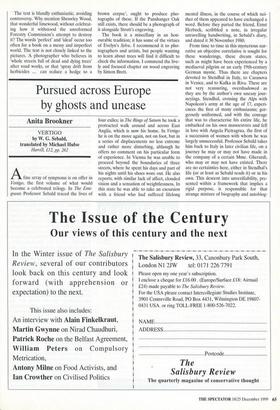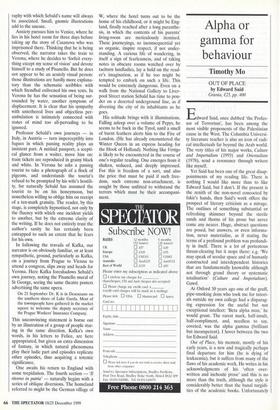Pursued across Europe by ghosts and unease
Anita Brookner VERTIGO by W. G. Sebald,
translated by Michael Hulse £12, pp. 262
Afine array of symptoms is on offer in Vertigo, the first volume of what would become a celebrated trilogy. In The Emi- grants Professor Sebald traced the lives of four exiles; in The Rings of Saturn he took a protracted walk around and across East Anglia, which is now his home. In Vertigo he is on the move again, not on foot, but in a series of displacements no less extreme and rather more disturbing, although he offers no comment on his particular form of experience. In Vienna he was unable to proceed beyond the boundaries of three streets, where he spent his days and part of his nights until his shoes wore out. He also reports, with similar lack of affect, clouded vision and a sensation of weightlessness. In this state he was able to take an excursion with a friend who had suffered lifelong
mental illness, in the course of which nei- ther of them appeared to have exchanged a word. Before they parted the friend, Ernst Herbeck, scribbled a note, in irregular unravelling handwriting, in Sebald's diary, and dated it 30 November 1980.
From time to time in this mysterious nar- rative an objective correlative is sought for these wanderings, these dream states, such as might have been experienced by a mediaeval pilgrim or an early 19th-century German mystic. Thus there are chapters devoted to Stendhal in Italy, to Casanova in Venice, and to Kaflca in Riva. These are not very reassuring, overshadowed as they are by the author's own uneasy jour- Stendhal, crossing the Alps with Napoleon's army at the age of 17, experi- ences the first of many enthusiasms; gor- geously uniformed, and with the courage that was to characterise his entire life, he embarked on his own manoeuvres and fell in love with Angela Pietragrua, the first of a succession of women with whom he was largely unsuccessful. Professor Sebald takes him back to Italy in later civilian life, on a journey he may or may not have made in the company of a certain Mme. Gherardi, who may or may not have existed. There are no certainties here, either in Stendhal's life (or at least as Sebald reads it) or in his own. This descent into unverifiability, pre- sented within a framework that implies a rigid purpose, is responsible for that strange mixture of biography and autobiog- raphy with which Sebald's name will always be associated. Small, gnomic illustrations add to the unease.
Anxiety pursues him to Venice, where he lies in his hotel room for three days before taking up the story of Casanova who was imprisoned there. Thinking that he is being observed, the narrator takes the train to Verona, where he decides to 'forfeit every- thing except my sense of vision' and devote himself to a study of Pisanello. But he does not appear to be an acutely visual person: those illustrations are hardly more explana- tory than the schematic scribbles with which Stendhal enlivened his own texts. In Verona he has the sensation of being sur- rounded by water, another symptom of displacement. It is clear that his sympathy with untethered lives and objectless per- ambulation is intimately connected with states of mind too all-pervading to be ignored.
Professor Sebald's own journeys — in Italy, in Austria — turn imperceptibly into fugues in which passing reality plays an insistent part. A mislaid passport, a scepti- cal glance from a waiter, move him on: train tickets are reproduced in grainy black and white. In Verona he asks a passing tourist to take a photograph of a flock of pigeons, and understands the tourist's refusal to be prompted by his wife's hostili- ty, for naturally Sebald has assumed the tourist to be on his honeymoon, but nonetheless willing to oblige him on receipt of a ten-mark gratuity. The reader, by this stage, is completely hypnotised, not only by the fluency with which one incident yields to another, but by the extreme clarity of the writing. If he does not entirely trust the author's sanity he has certainly been entrapped to such an extent that he fears for his own.
In following the travails of Kafka, our narrator is on obviously familiar, or at least sympathetic, ground, particularly as Kafka, on a journey from Prague to Vienna to attend a congress, slips away and heads for Verona. Here Kafka foreshadows Sebald's own journey, noting the Pisanello mural of St George, seeing the same theatre posters advertising the same opera.
On 21 September Dr. K is in Desenzano on the southern shore of Lake Garda. Most of the townspeople have gathered in the market square to welcome the deputy secretary of the Prague Workers' Insurance Company.
This unconvincing statement is borne out by an illustration of a group of people star- ing in the same direction. ICafica's own words, in his letters to Felice, are here appropriated, but given an extra dimension of fantasy, in which natural phenomena play their ludic part and episodes replicate other episodes, thus acquiring a totemic significance.
One awaits his return to England with some trepidation. The fourth section — ritorno in patria' — naturally begins with a series of oblique diversions. The homeland referred to might be the German village of
W, where the hotel turns out to be the home of his childhood, or it might be Eng- land, finally reached after a long parenthe- sis, in which the contents of his parents' living-room are meticulously itemised. These journeyings, so inconsequential yet so organic, inspire respect, if not under- standing. A curious life of wandering, in itself a sign of fearlessness, and of taking notes in obscure rooms watched over by taciturn landladies, lay a hold on the read- er's imagination, as if he too might be tempted to embark on such a life. This would be extremely dangerous. Even on a walk from the National Gallery to Liver- pool Street station Sebald has time to pon- der on a deserted underground line, as if divesting the city of its inhabitants as he goes.
His solitude brings with it illuminations. Falling asleep over a volume of Pepys, he seems to be back in the Tyrol, until a smell of burnt feathers alerts him to the Fire of London. (He has already encountered the Winter Queen in an express heading for the Hook of Holland). Nothing like Vertigo is likely to be encountered in the course of one's regular reading. One emerges from it shaken, seduced, and deeply impressed. For this is freedom of a sort, and also the price that must be paid if such free- dom, such extreme non-attachment, is sought by those unfitted to withstand the terrors which must be their accompani- ment.























































































































 Previous page
Previous page